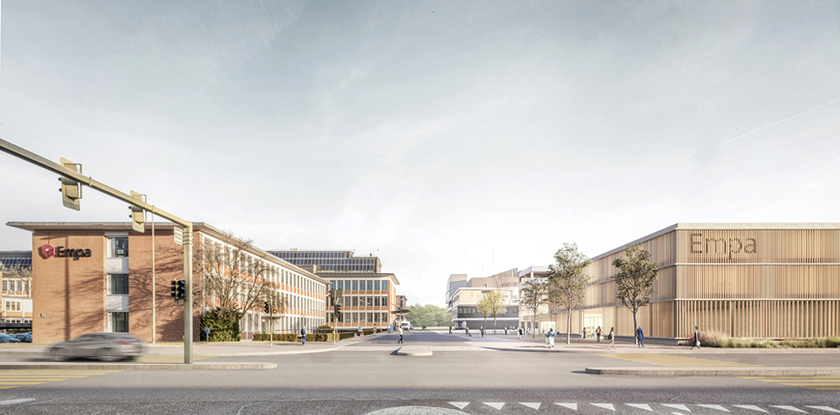New Empa and Eawag campus takes shape

Empa and Eawag are expanding their campus. The extension buildings also illustrate sustainable construction. The project is nearing completion and shows ideas for greenhouse gas reduction, circular economy and energy generation and saving on the construction site.
The Swiss Federal Laboratories for Materials Testing and Research (Empa) and the ETH Domain’s water research institute, Eawag, are expanding their campus on the Empa site in Dübendorf, which will soon go into operation under the name co-operate, according to a media release. The architecture and design of the extension are conceived as a “signpost” for climate and environmentally friendly building and show approaches for less resource consumption and minimal CO2 emissions, for more circular economy through less material consumption as well as for gaining and saving energy, it says.
A attractive building has been erected near the entrance to the campus. The construction is a wood-concrete car park, which was realised by Implenia using a hybrid construction method. Instead of concrete ribbed ceilings, wooden beam ceilings were used over an area of 9300 square metres. As a result, the building requires considerably thinner concrete layers and reduces the consumption of cement, which is “harmful to the climate”.
According to Kevin Olas, head of Empa’s real estate division, lighting, electrical lines and sewage pipes had to be installed with consideration for the aesthetics of the hybrid construction. In addition, the modular construction method using prefabricated parts had to be used in view of climate change. This meant that parts of the building could be converted into workshops, for example.
In addition to building materials such as steel, concrete and wooden elements, human “raw materials” can also be recycled: urine, for example, is suitable as a raw material for fertiliser production because it contains the nutrients nitrogen, phosphorus and potassium. The urine collection system NoMix-WCs installed in the laboratory building creates the raw material for the recycled fertiliser Aurin. This is marketed by the Eawag spin-off Vuna.
Other building blocks on the campus include photovoltaics, recycled asphalt and no asphalt in the landscaping, which focuses on promoting biodiversity and provides for the planting of a diverse flora.
Source: empa.ch